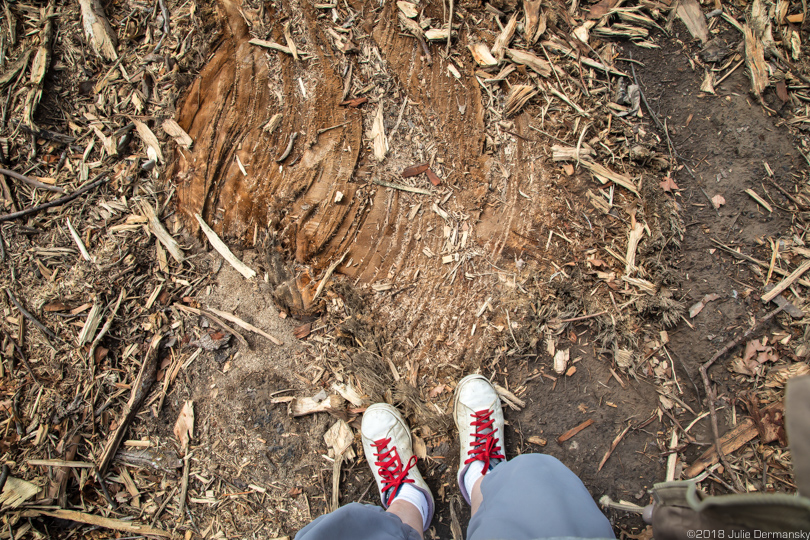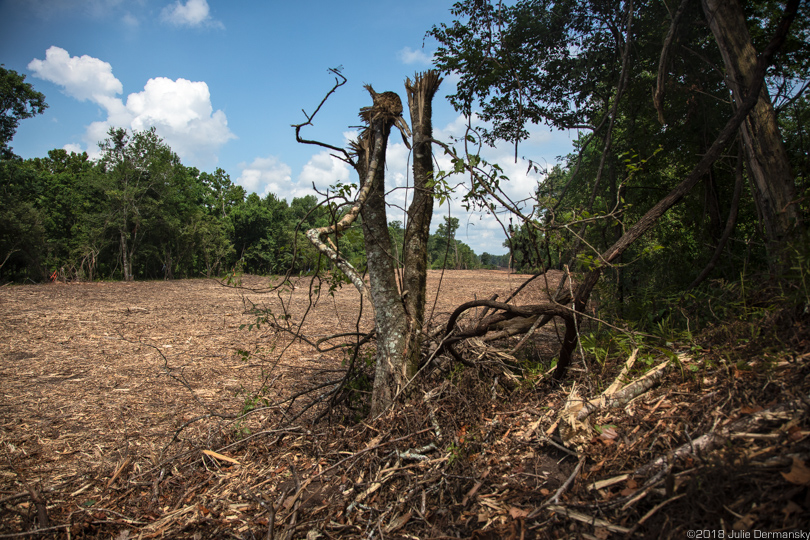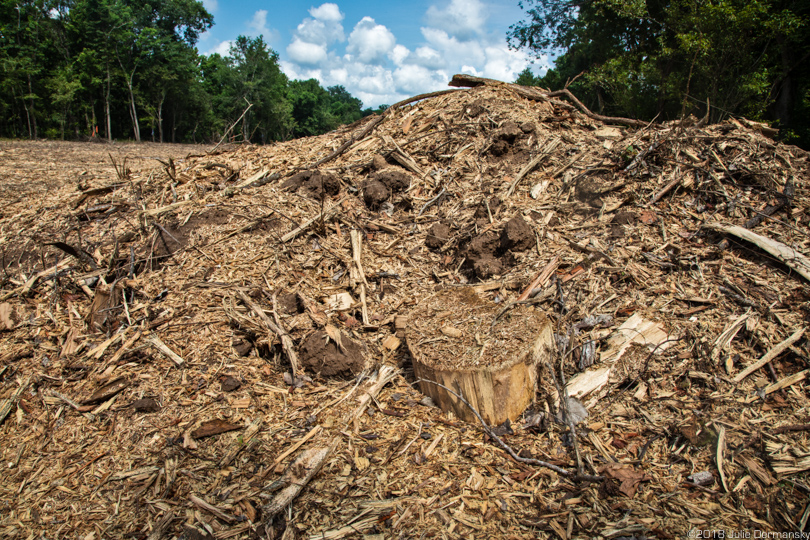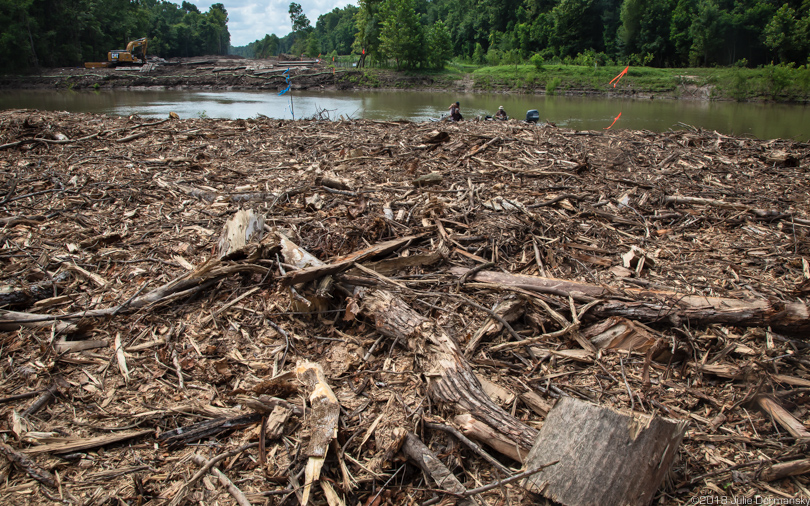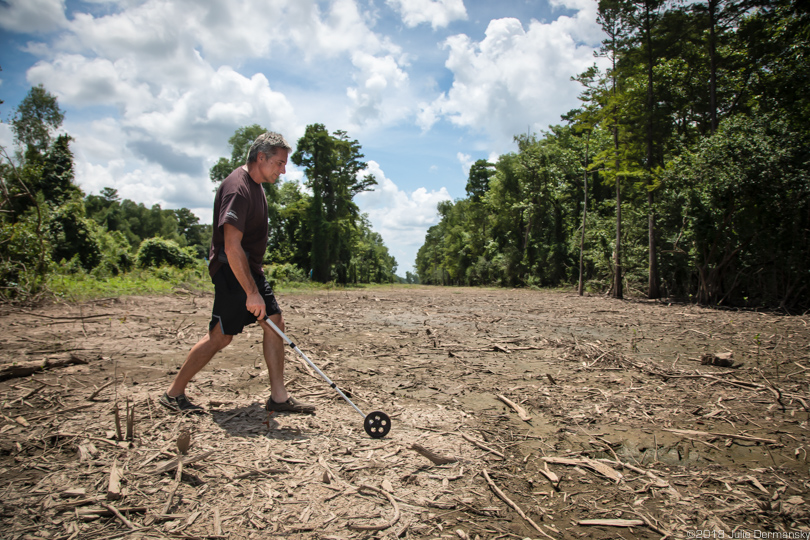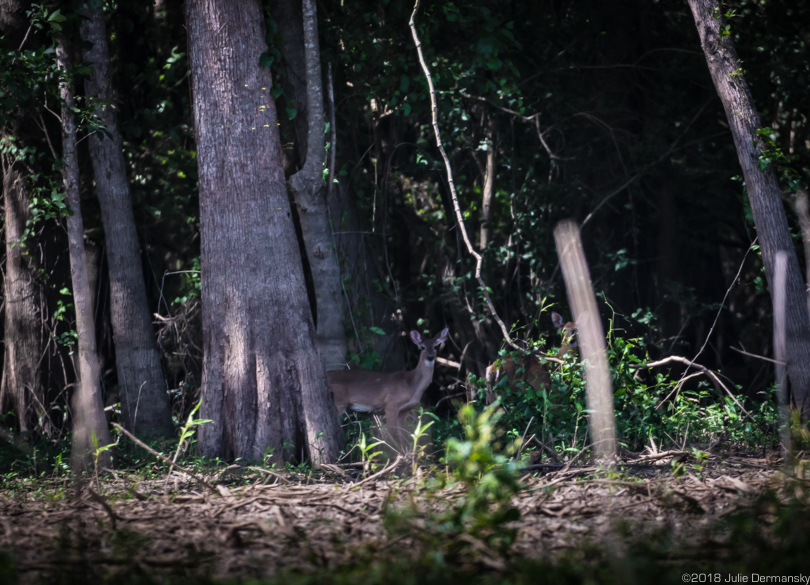A day before a federal court reaffirmed Bayou Bridge LLC could keep building an oil pipeline through Louisiana’s Atchafalaya Basin, I stood on a cypress tree stump there, viewing the destroyed trees which pipeline opponents were trying to save.
On both sides of the Bayou Bridge pipeline’s right-of-way, a path of shredded trees cut through the massive river swamp — the nation’s largest — home to abundant wildlife and fishing grounds for wild crawfish.
On July 6, a three-judge panel of the U.S. 5th Circuit Court of Appeals ruled that the Army Corps of Engineers properly granted a permit for the 162.5 mile pipeline that cuts through the basin, a National Heritage Area. The decision reverses a lower court’s ruling that temporarily blocked the pipeline’s construction ahead of a hearing challenging the Army Corps decision to issue a permit through the basin.
The controversial pipeline is being built by Bayou Bridge Pipeline LLC, a subsidiary of Energy Transfer Partners, the same company behind the Dakota Access pipeline. The Louisiana pipeline will serve as the tail end of a network starting with Dakota Access that will transport crude oil from North Dakota to the Gulf Coast for refining and potential export.
Construction of the pipeline across southern Louisiana from Lake Charles, near the Texas border, to a railway terminal in St. James, next to the banks of the Mississippi River, is already more than three-quarters complete. According to Bayou Bridge Pipeline LLC attorneys, the pipeline is expected to be finished by October this year.
Bayou Bridge pipeline right-of-way on July 5.
Trees splintered to clear the way for the Bayou Bridge pipeline in the Atchafalaya Basin.
A Case to Protect the Basin’s Unique Habitat
Judge Thomas Reavley dissented from the 2–1 decision. Reavley found flaw with the Army Corps’ justifications for granting the permit through the basin without a more in-depth environmental impact study.
The recent ruling stems from a lawsuit filed by Earthjustice, a nonprofit environmental law firm, in federal court on January 11 against the Army Corps of Engineers. Suing on behalf of the Atchafalaya Basinkeeper, the Louisiana Crawfish Producers Association-West, Gulf Restoration Network, the Waterkeeper Alliance, and the Sierra Club, Earthjustice asserts the Corps acted “arbitrarily and capriciously” when it issued a permit for the pipeline. The suit alleges that the Corps violated the Clean Water Act and other environmental laws when it approved a permit for the project.
The plaintiffs claim the pipeline could hurt the commercial crawfishing industry and wildlife in the area by interfering with the basin’s water flow. In addition, they say it could weaken the basin’s natural flood protection for millions of people in the Mississippi River Valley and coastal Louisiana.
The lawsuit claims the Army Corps has failed to hold oil and gas companies in the basin accountable for countless permit violations for existing pipelines and wells, which have contributed to the degradation of the basin’s wetlands. It asks the court to overturn the permit until the Corps enforces permits for oil and gas pipeline companies that are out of compliance in the basin already.
U.S. District Judge Shelly Dick issued a temporary injunction halting work on the pipeline on February 28. Her ruling was a short-lived victory for the pipeline opponents. Her order was suspended by the 5th District Court in New Orleans on March 15, pending a final decision by the appeals court in Houston, Texas. This action allowed the company to resume construction, which it promptly did.
The latest appeals court ruling states that Dick “misperceived the applicable regulations” governing the U.S. National Environmental Policy Act when issuing a preliminary injunction in February that temporarily stopped construction.
The appeals court has now returned the case to Judge Dick, who will reconsider the merits of the lawsuit. However, the case likely won’t by heard until after the pipeline construction is complete.
“We are disappointed in the decision but the fight to protect the Atchafalaya from risky and harmful crude oil pipelines will continue,” Jan Hasselman, Earthjustice lead counsel in the case, said in a statement following the ruling. “It is time for the oil industry to stop treating this special place — and the many people who rely on it for their livelihoods — as a national sacrifice area.”
Dean Wilson, executive director of the environmental group Atchafalaya Basinkeeper, was also disappointed but not surprised by the ruling.
“With little to no enforcement from the Corps, pipeline companies have already devastated our coast and our Atchafalaya Basin, destroying some of the most amazing ecosystems on Earth, putting millions of people at greater risk of flooding, and making countless coastal communities inhabitable by humans,” Wilson said after the ruling.
“The Corps doesn’t even have a boat,” Wilson pointed out, which he said means the agency has to rely on crawfishers and environmental groups like the Atchafalaya Basinkeeper to alert it to compliance failures by the oil and gas industry in the basin.
Monitoring the Atchafalaya Basin
It was during Wilson’s last trip into the basin to monitor the pipeline’s construction on July 5 that I saw the pulverized trees and heard more trees being ground up in the distance.
View of the Bayou Bridge pipeline right-of-way from the banks of Bayou Chene in the Atchafalaya Basin on July 5.
On a previous trip on May 31, we stopped at an area on state land already cleared of trees along the pipeline right-of-way. Wilson measured the width of the clearing in three places and found each site he measured exceeded the Bayou Bridge pipeline’s permit, which limits the right-of-way in wetlands to 75 feet.
Dean Wilson checking the width of the clearing for the Bayou Bridge pipeline’s right-of-way on May 31.
Deer in the basin near the Bayou Bridge pipeline right-of-way on May 31.
The Atchafalaya Basinkeeper and the Gulf Restoration Network addressed the alleged permit violations found on that trip in a letter sent to the Army Corps on June 1.
It followed a letter sent on May 9 that indicated additional potential permit violations observed by the two environmental groups and the Louisiana Crawfish Producers Association-West during overflights of the area and multiple boat trips taken since construction began at the end of January.
Though the pipeline will likely be done before a final ruling on the lawsuit is reached, Earthjustice asserts that if the court eventually rules in favor of the plaintiffs, shutting down the pipeline could be an option.
“Last week’s ruling reopens the door to more business-as-usual in the Atchafalaya Basin,” Mish Mitchell of the Atchafalaya Basinkeeper told me after the ruling. “But we keep fighting, in this case and for the Atchafalaya Basin — we will always trudge ahead to protect this unique place for future generations to enjoy.”
Main image: Standing on a leveled cypress tree stump in the Atchafalaya Basin. Credit: All photos by Julie Dermansky for DeSmog
Subscribe to our newsletter
Stay up to date with DeSmog news and alerts


